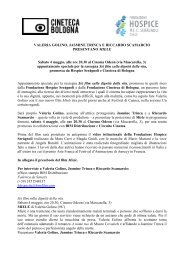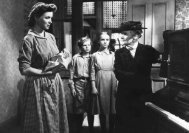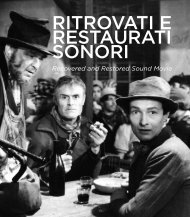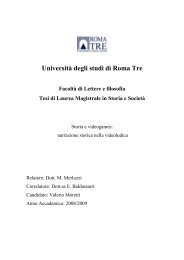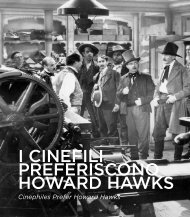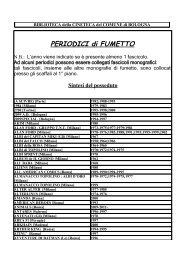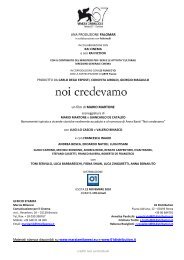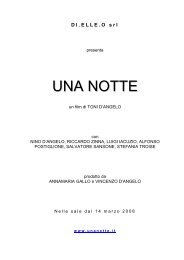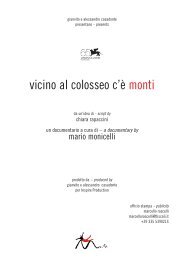Catalogo 1999 - Cineteca di Bologna
Catalogo 1999 - Cineteca di Bologna
Catalogo 1999 - Cineteca di Bologna
Create successful ePaper yourself
Turn your PDF publications into a flip-book with our unique Google optimized e-Paper software.
But no, they are cheering. If the film tears, it will be repaired again. Danger only exists in the<br />
imagination of those broody and finicky ones, who are too spoilt to be part of the naive people anyway.<br />
And in the end they too must admit repentingly that the gestures of politics are eminently suitable for<br />
the cinematograph. All else is a mere phantom that vanishes in the sun of imperial favour. (Berthold<br />
Viertel, “Im Kinematographentheater”, März Jg. 4, Heft 20, 18. Oktober 1910, in Fritz Güttinger, Kein<br />
Tag ohne Kino, 1984)<br />
18,40<br />
Ritrovati e restaurati / Recovered & restored<br />
IMBARCO A MEZZANOTTE (Stranger on the prowl, 1952) R.: Joseph Losey (Andrea Forzano).<br />
S.: Noël Calef. Sc.: Andrea Forzano (Ben Barzman). F.: Henry Alekan. Scgf.: Antonio Valente. C.:<br />
G.C. Sonzogno. Mont.: Thelma Connel. In.: Paul Muni (l’uomo), Joan Lorring (Angela), Vittorio<br />
Manunta (Giacomo), Luisa Rossi (madre <strong>di</strong> Giacomo), Aldo Silvani (Peroni), Arnoldo Foà (l’ispettore),<br />
Enrico Glori, Linda Sini, Giulio Marchetti, Noel Calef, Henry Alekan. P.: Noël Calef, Alfonso Bajocci,<br />
Bernard Vorhaus e Ben Barzman per la Riviera Film, Giacomo Forzano per il Consorzio Produttori<br />
Cinematografici <strong>di</strong> Tirrenia Film e per la United Artists.<br />
35mm. L.: 2300m. D.: 82’ a 24 f/s. Versione originale inglese con sottitoli italiani / English version<br />
with Italian subtitles<br />
Da: <strong>Cineteca</strong> del Comune <strong>di</strong> <strong>Bologna</strong> in collaborazione con la Cinémathèque Française e il Comune <strong>di</strong><br />
Pisa<br />
Copia positiva stabilita nel 1998 a partire da un positivo safety della versione inglese del film -<br />
ripulitura dei <strong>di</strong>fetti della colonna sonora. / Positive print preserved in 1998 from a safety positive of<br />
the English version - <strong>di</strong>gital restoration of the soundtrack.<br />
Un produtore americano, John Weber, gli ha proposto un film da girare in Italia. La sceneggiatura è già pronta, e l’ha scrita, adatando un romanzo del’ebreo francese Noël Calef, il<br />
Ben Barzman <strong>di</strong> The Boy with Green Hair [.] Il set porta Losey, che è in Italia per la prima volta (“Durante i miei viaggi in Europa prima dela guerra mi ero sempre rifiutato <strong>di</strong><br />
andare in Italia, forse a torto, però era una questione <strong>di</strong> principio, per causa <strong>di</strong> Mussolini”), tra Pisa e Livorno: sono gli stu<strong>di</strong> Tirrenia dei Forzano, già caposaldo produtivo del cinema<br />
fascista, impegnati ora in un tentativo <strong>di</strong> rilancio al’ombra protetiva del nuovo governo. Curiosamente, il contato con i Forzano viene procurato da queli che Losey chiama “i miei<br />
amici comunisti americani”, e la produzione si trova fraturata tra un’ala comunista e un’ala ancora risolutamente fascista. [.]Conclusiva ironia, il film, ormai inservibile il vero nome<br />
del’autore, sarebbe stato firmato da Andrea, figlio del vecchio Forzano, del tuto <strong>di</strong>sinteressato al’impresa e che, secondo i ricor<strong>di</strong> <strong>di</strong> Losey, non si spinse nemmeno ad una visita sul<br />
set. [.] Il regista senza nome riprende, si <strong>di</strong>rebbe, da dove era stato interroto. Come The Big Night, il primo film del’esilio si configura come la storia, dal matino a mezzanote, <strong>di</strong> un<br />
padre e <strong>di</strong> un figlio: anche se il legame qui non è dato dal sangue, ma da una fortuita <strong>di</strong>sperazione comune, il vincolo si stringe intorno ala con<strong>di</strong>visione e alo scambio (involontario)<br />
<strong>di</strong> una colpa. Per paura il bambino ruba una botiglia <strong>di</strong> late, per fame l’uomo strangola la lataia, e <strong>di</strong>etro i loro gesti si profila, nel <strong>di</strong>stacco brechtiano che corregge le implicazioni<br />
patetiche, quela stessa innocenza dei deboli che per il comunista Losey è, in questi anni, materia non <strong>di</strong>scutibile: “I have a right to eat, a right to live” (arriverà più tar<strong>di</strong>, nei cupi<br />
capolavori dela maturità, l’inquinamento e la tortuosa alienazione <strong>di</strong> ogni rapporto, personale e <strong>di</strong> classe). Come in parte The Boy with Green Hair, come completamente The<br />
Lawless, come <strong>di</strong> necessità il remake M, Imbarco a mezzanote è il film <strong>di</strong> una fuga. Se il ragazzo dai capeli ver<strong>di</strong> e i giovani in<strong>di</strong>os <strong>di</strong> The Lawless venivano spinti ala fuga<br />
dal’intoleranza e dal razzismo, qui l’uomo si trova a dover fuggire per la povertà <strong>di</strong> un dopoguerra. Del dopoguerra italiano. Il clandestino Losey, sbarcato sui set toscani dela<br />
Tirrenia, viene a sua volta assalito dai paesaggi “pro<strong>di</strong>giosi e ingombranti” del’Italia non ricostruita, non riconciliata. Dala pro<strong>di</strong>giosa, ingombrante memoria del suo cinema recente,<br />
glorioso, e già avviato al <strong>di</strong>sarmo. (Paola Cristali, “Note su Imbarco a mezzanote”, Cinegrafie, n. 12, <strong>1999</strong>)<br />
John Weber, an American producer, had asked him to work on a film in Italy. The screenplay, drawn from a novel by a French<br />
Jewish writer, Noël Calef, was ready. It had been written by Ben Barzman, the author of The Boy with Green Hair (...). The<br />
location shooting brought Losey, who was in Italy for the first time (“In my travels throughout Europe before the war, I had<br />
always refused to go to Italy, maybe mistakenly; however, it was a matter of principle, due to Mussolini”), to the area between<br />
Pisa and Livorno: the Tirrenia stu<strong>di</strong>os of the Forzanos, the lea<strong>di</strong>ng stu<strong>di</strong>os of Fascist cinema, now trying to make a comeback<br />
under the protective wings of the new Republican government. Oddly, contact with the Forzanos had been made through people



